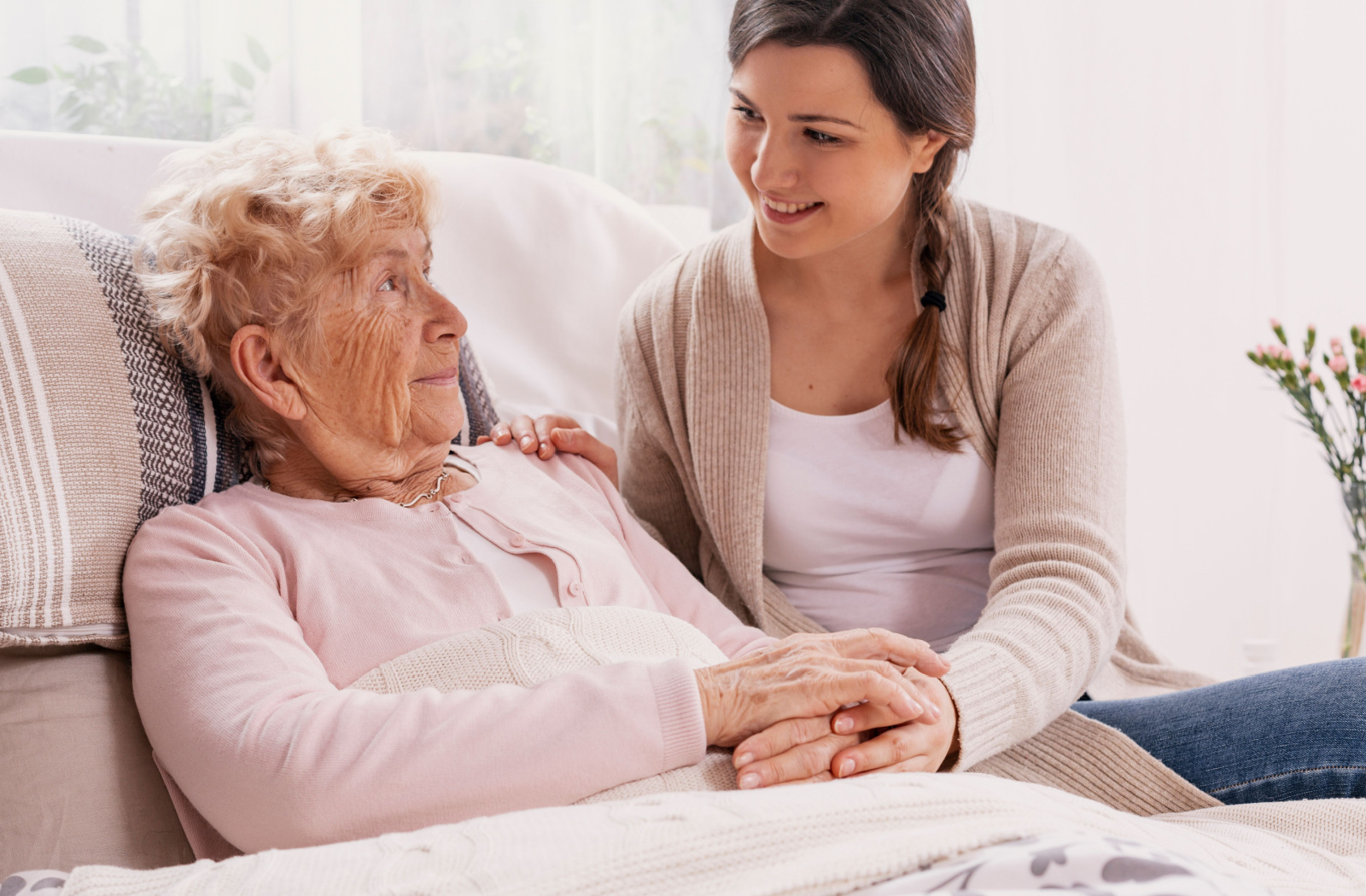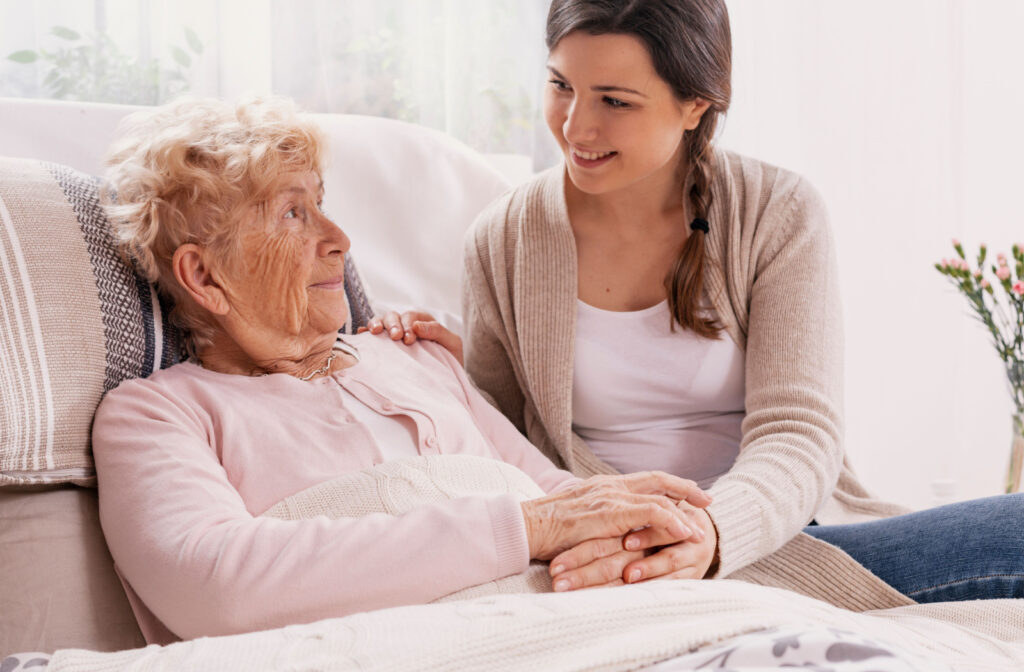Caring for a loved one with Alzheimer’s disease can be a challenging and emotional journey. As Alzheimer’s progresses, the responsibilities and demands on caregivers and family members can increase significantly.
It is essential to approach caregiving with empathy, knowledge, and self-care to provide the best possible support for your loved one while maintaining your own well-being.
Understanding Alzhiemer’s
To support a loved one with Alzheimer’s it is important to first develop an understanding of the disease.
Alzheimer’s is a progressive disease that impacts the parts of your brain that control thought, memory, and language. The disease may cause symptoms ranging from mild memory loss to a complete inability to communicate.
Alzheimer’s disease is the most common form of dementia, and an estimated 6.7 million American seniors live with it.
The Stages of Alzheimer’s
In most cases, Alzheimer’s progresses slowly and can be defined by three stages – mild, moderate, and severe:
- Mild: In its earliest stage, Alzheimer’s may begin to impact your loved one’s cognitive ability, however, they will still be able to function independently. Common symptoms in this stage may include memory loss, poor judgement, wandering or getting lost, and changes in mood or personality.
- Moderate: At this stage your loved one will require more comprehensive supervision and care. Symptoms of moderate Alzheimer’s may include forgetting events, difficulty recognizing family members, difficulty with reading or writing, and hallucinations or paranoia.
- Severe: Once Alzheimer’s reaches this stage, your loved one will no longer be capable of communicating or functioning independently at all. Common symptoms include an inability to communicate, no awareness of surroundings, and general physical decline.
As the caregiver of someone with Alzheimer’s, you will find that your responsibilities increase as the condition progresses. Someone with mild Alzheimer’s may only require occasional and often hands-off support, while someone with severe Alzheimer’s may require comprehensive 24/7 care.
5 Tips for Caregivers and Families of People with Alzheimer’s
The burden of caring for a loved one with Alzheimer’s most often falls on loved ones. According to the Alzheimer’s Association, 83% of care provided to seniors in the U.S. comes from loved ones or other unpaid caregivers. Nearly half of these caregivers are caring for a senior with Alzheimer’s or another form of dementia.
Below we will discuss five tips for caregivers and families of people with Alzheimer’s, to help ensure that you provide the best support possible to your loved one and prevent caregiver burnout.
Tip 1: Educate Yourself
Understanding Alzheimer’s disease is crucial for caregivers and families. Take the time to educate yourself about the condition, its symptoms, and its progression. Knowing what to expect and familiarizing yourself with available resources will empower you to make informed decisions regarding your loved one’s care.
Organizations such as the Alzheimer’s Association offer educational materials, support groups, and online resources to assist families in gaining knowledge about the disease.
Tip 2: Develop a Routine
People with Alzheimer’s thrive on routines and familiarity. Establishing a structured daily routine can help reduce confusion and anxiety for your loved one.
Ensure that daily activities, such as meals, medication, and exercise, occur at consistent times. Maintaining a stable environment and minimizing disruptions can contribute to a sense of security and well-being.
Tip 3: Simplify Communication
As Alzheimer’s progresses, communication becomes increasingly challenging. Keep conversations simple and concise, using clear and straightforward language. Maintain eye contact and use nonverbal cues to enhance understanding.
Avoid correcting or arguing with your loved one, as it can lead to frustration. Instead, practice active listening, patience, and empathy. Be mindful of your tone of voice and body language, as they can convey more meaning than words alone.
Tip 4: Establish Your Support Network
Don’t attempt to shoulder the caregiving responsibilities alone. Reach out to friends, family members, and support groups for assistance. Building a reliable support network will help you cope with the challenges that arise while caring for someone with Alzheimer’s.
Seek support from others who have gone through or are going through similar experiences. They can provide valuable advice, emotional support, and a safe space for expressing your feelings.

Tip 5: Take Care of Yourself
Caring for someone with Alzheimer’s can be emotionally and physically draining. Remember to prioritize your well-being to maintain the strength required for caregiving. Make time for self-care activities you enjoy, such as exercising or spending time with friends.
Reach out to respite care services, family members, or support groups to provide relief when needed. Taking care of yourself is not selfish—it is essential for your overall health and ability to provide the best care for your loved one.
Knowing When to Ask for Help
Caring for a loved one with Alzheimer’s can be a physically, mentally, and emotionally exhausting endeavor. If you find yourself feeling overwhelmed by your loved one’s care needs, it may be time to consider transitioning them into a senior living community.
What to Expect from Memory Care
Memory care is a type of senior living community specifically designed for seniors living with Alzheimer’s and other forms of dementia. This type of community can provide your loved one with access to around-the-clock support from trained staff. Senior living communities also offer a range of services and programs to provide residents with a high standard of living.
Your Partner in Caregiving
At Whitefish at the Lakes, we offer a range of senior living options. Whether you are looking for short-term respite care or long-term memory care, our team is here to support you and your loved ones with comprehensive and compassionate care. Contact our team to learn more about how our senior living community can support your family.



